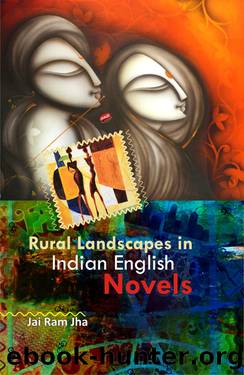The Rural Landscapes in Indian English Novels by Dr. Jai Ram Jha

Author:Dr. Jai Ram Jha [Jha, Jai Ram]
Language: eng
Format: epub
Publisher: Aadi Publications
5
A Perusal of Themes
In the later part of the 19th century and the beginning of the 20th century Indian soil has planted many Indo-Anglian novelists, among them Anand, Raja Rao and Narayan have put their stamp of fame before World War II. They have retained their impulse to creation, extending their popular appeal and these three have succeeded in imparting the contemporary literary scenes. Apart from these prominent novelists, Bhabani Bhattacharya, Manohar Malgonkar, Kamala Markanday, Prawar Jhabwala and other women novelists took active part and care in writing Indian material in English style and language.
The thematic progress of Indo-Anglian novels also deserves consideration. Mulk Raj Anand champions himself as the pioneer among the founding fathers of fiction. Anand, in his description of fictional theme seems a novelist of human value and human suffering. Throughout his novels, we find the craving for food and clothing on the one hand and struggling for existence in the religious dogmatic Hindu society, which has been custom based since time immemorial. In fact, his theme touches the heart of the reader and creates pity and mercy for the characters. He wrote a number of novels containing his best work. They are Untouchable (1935), Coolie (1936), Two Leaves and a Bud (1937), The Village (1935), and Across the Black Waters (1941). They were written between 1935 and 1940.
Untouchable is Anandâs first novel and his most compact and artistically satisfying work. It depicts a day in the life of Bakha, a sweeper boy, and brings out the impact on him of the various events which take place by giving us his âstream of consciousnessâ in a manner of James Joyce and Virginia Wolf. The novel has a good deal of human faces, and more of sweeping and sweepers.
The central figure in this novel is Bakha. This 18-year-old boy is one of the sons of Lakha, the Jamadar of the sweepers. Bakha is a child of the twentieth century, and the impact of new influences causes stirrings within him. From an English soldier he has secured a pair of old breeches, and from a sepoy a pair of old boots; he would, if he could like to be in the fashion. Nevertheless, as the day dawns, his world of latrine cleaning also begins, and his dreams notwithstanding, he is steady and efficient worker. Though his job was dirty, he remained comparatively clean. His sister, Sohini is also dexterous after her fashion. One day she goes to the village well to fetch water. Kali Nath, the priest of the temple, more as a cure for constipation than in an access of generosity, agrees to draw water from the well for the assembled outcasters. Having drawn a pail with considerable difficulty, he sees Sohini, feels attracted to her youthfulness and driving away the others, pours the water into her pot and suggests that she should come to his later in the day to clean the courtyard. When she does go, he makes improper suggestions to her, and she starts screaming, he shouts âpollutedâ and gathers a crowd of indignant high caste people.
Download
This site does not store any files on its server. We only index and link to content provided by other sites. Please contact the content providers to delete copyright contents if any and email us, we'll remove relevant links or contents immediately.
The Hating Game by Sally Thorne(19276)
The Universe of Us by Lang Leav(15076)
Sad Girls by Lang Leav(14423)
The Lover by Duras Marguerite(7903)
The Rosie Project by Graeme Simsion(6415)
Smoke & Mirrors by Michael Faudet(6192)
Big Little Lies by Liane Moriarty(5804)
The Poppy War by R. F. Kuang(5698)
The Shadow Of The Wind by Carlos Ruiz Zafón(5693)
An Echo of Things to Come by James Islington(4884)
Memories by Lang Leav(4800)
What Alice Forgot by Liane Moriarty(4634)
From Sand and Ash by Amy Harmon(4522)
The Poetry of Pablo Neruda by Pablo Neruda(4109)
The Tattooist of Auschwitz by Heather Morris(3848)
Ficciones by Jorge Luis Borges(3636)
The Rosie Effect by Graeme Simsion(3468)
Guild Hunters Novels 1-4 by Nalini Singh(3464)
THE ONE YOU CANNOT HAVE by Shenoy Preeti(3372)
